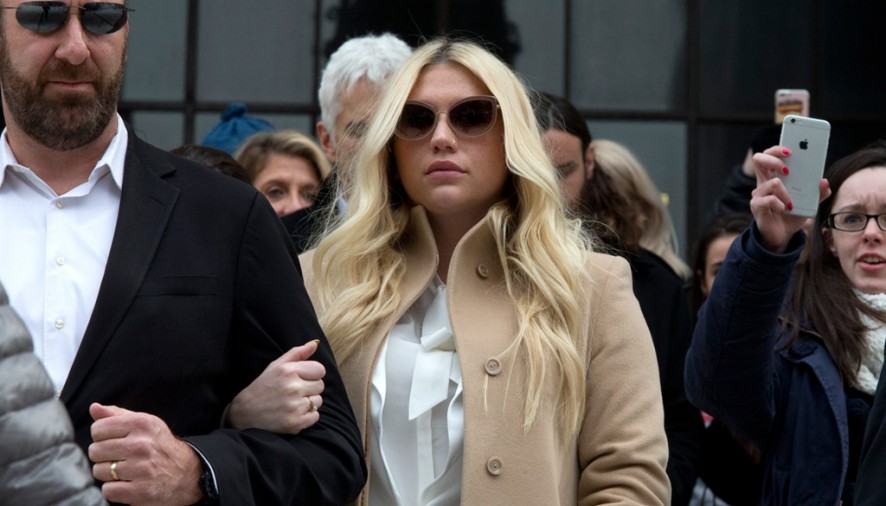Heather Nash discusses what it means to be a woman in the music industry when your autonomy isn’t the top priority, and how it exposes those who are afraid to rock the boat.
If you haven’t heard – and aren’t already disgusted with life, the world, and the patriarchal system as it stands today – Kesha has lost a case at the New York Supreme Court, after taking out a lawsuit against producer Dr Luke for sexual and emotional abuse over a period of ten years. Kesha now needs to fulfil her contract with Sony and put out another six albums with the man who has reportedly abused and raped her, because the judge decided it was ‘the commercially reasonable thing.’ A woman’s life, career, body and mental health have been overruled by the need to make money and honour a contract.
Fellow artists, industry members, fans, feminists, sexual abuse survivors, along with the rest of the good-hearted world has called out Sony and the court on their ruling, creating the hashtags #FreeKesha and #SonySupportsRape, and countless online petitions to try and sway the decision. However, #FreeKesha is doing more than just pressurising Sony: it’s shining a spotlight on the treatment of victims in sexual abuse cases everywhere. Dr Luke wasn’t even up for conviction – because as Kesha probably knew, there wasn’t enough evidence to put him behind bars. Instead she just wanted to record under a different producer, on one of Sony’s other labels. Apparently, there wasn’t even enough evidence for Sony to give her that either. Let’s not forget, Zayn Malik was able to leave his contract with One Direction under Sony because he simply felt overworked. He’s now under a different branch on the Sony label, something that apparently can’t be arranged for Kesha. Sony says she ‘cannot have it both ways.’ As far as I can see, Kesha only wants it one way – to be free from Dr Luke.
Abuse trials, and especially sexual assault trials, tend to drag on in a cycle of the abuser’s word against the victim’s. This is because the justice system is simply not built to protect victims. Reporting sexual abuse is humiliating and traumatic for those involved. Often the thought of the trial process – where they will be examined, often be labelled a liar, and possibly slut-shamed – doesn’t seem worth it. To the court Kesha is a beautiful, successful artist, and crucially has a ‘bad’ reputation, who sings openly about topics like sex and drugs. She isn’t what you imagine a ‘victim’ to be. She’s a perfect example of society’s tendency towards victim-blaming.
The support for Kesha has been huge: Demi Lovato, Ariana Grande, Adele, and Lady Gaga have all announced their
support for Kesha, publically shaming Sony and showing that this is an issue that needs to be talked about openly. But in contrast to those who have voiced their support loudly, it has made the silence of those who have said nothing even more obvious.
Most obviously, of course, was Taylor Swift’s apparent lack of support for Kesha. Instead of lending her heavyweight name to the pressure on Sony, Taylor Swift announced via one of her reps that she has donated $250, 000 to help Kesha’s ‘financial needs.’ Taylor’s donation seems a little like gesture politics. It smacks of wanting to do the correct feminist thing, but not being sure how to go about that without ruffling too many feathers. Taylor’s money may indeed help Kesha and is a show of support, but there’s a feeling she’s also keeping a safe distance too. Her work with her producer, Max Martin, comes into contact with Sony a lot, which explains her hesitation. Although this is rom the same artist who was so outspoken on the rights of artists when it came to Apple Music and the free trial, that Apple performed a complete U-turn on the back of her opposition. It’s been proven before – when she speaks, the industry listens. What would be the results if Taylor
publically challenged Sony in the same way?
However, this goes beyond arguments about fake feminism. A letter from Swift could help in the crucial need to open up a dialogue on why not only Kesha’s ruling is unfair, but point out that society and justice must do more to protect abuse victims as a whole. Kesha is important, but many abuse victims can’t afford or never feel comfortable enough to speak out against their abusers in the way that she has. Kesha’s case reveals the sexism at the core of the music industry, but it also reveals the silencing of abuse victims at the core of our society.
But, even without Swift’s words, it appears Sony might be cracking under the pressure and attention from the likes of Adele and Lady Gaga, that Kesha’s case had attracted. Reports, somewhat dubiously founded, however, are circulating that Sony is preparing to cut ties with Dr Luke. However, only because keeping the producer on their label has become every PR agent’s worst nightmare and is starting to do damage to Sony’s reputation, and not because they actually sympathise with Kesha’s situation, of course. Dr Luke himself has denied the claims, saying that his relationship with Sony is ‘excellent’, but is he living on borrowed time? Everything is starting to get a little confused, and Sony it seems doesn’t know what to do with themselves.
Heather Nash

